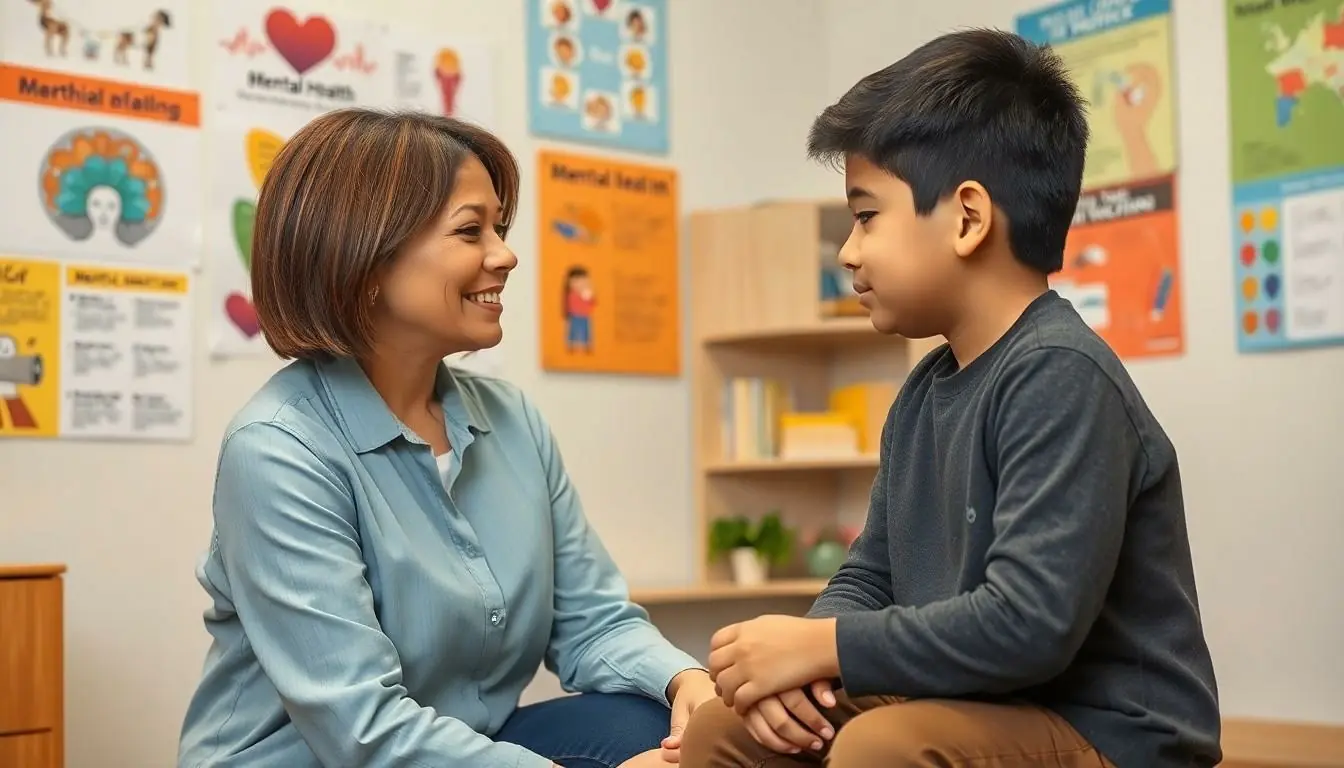Navigating the world of childhood can feel like an extreme sport—complete with unexpected twists and turns. Kids today face pressures that would make even the toughest adults sweat. From school stress to social media drama, it’s no wonder mental health support for children is more crucial than ever.
Table of Contents
ToggleUnderstanding Mental Health for Kids
Mental health plays a crucial role in children’s overall development. Addressing their mental well-being is essential for fostering resilience and supporting their emotional growth.
Importance of Mental Health in Childhood
Mental health in childhood forms the foundation for emotional stability in later years. Children equipped with healthy coping skills manage stress more effectively. Research indicates that early intervention promotes positive behavioral outcomes. In addition, nurturing a supportive environment encourages open conversations about feelings. Positive mental health contributes significantly to academic success and social interactions. Developing healthy emotional skills early reduces the risk of long-term mental health issues.
Common Mental Health Issues in Children
Anxiety disorders rank among the most prevalent mental health issues in children. Symptoms often manifest as excessive worry that interferes with daily activities. Attention-deficit/hyperactivity disorder (ADHD) affects focus and impulse control, complicating academic performance. Mood disorders, including depression, also occur, leading to withdrawal and changes in behavior. Behavioral issues can indicate underlying mental health challenges needing attention. Early detection and targeted support are vital for addressing these concerns effectively.
Local Resources for Mental Health Support

Access to local mental health resources ensures children receive the support they need. Various options exist to help parents find the right services.
Finding Mental Health Services Near You
Searching for mental health services nearby provides immediate solutions. The website of the Substance Abuse and Mental Health Services Administration (SAMHSA) offers a treatment locator tool to find local providers. Many parents also consider pediatricians as a starting point; pediatricians can provide referrals to mental health specialists. Local clinics frequently host informational sessions about available services. Online directories list therapists specializing in children’s mental health. Community organizations often share resources through local events.
Schools and Community Programs
Schools and community programs play a vital role in promoting mental health. Many institutions implement social-emotional learning curricula, which equip children with coping strategies. Counselors and school psychologists provide direct support to students experiencing difficulties. Local community centers may offer workshops on mental health awareness and stress management. Nonprofits often develop programs tailored specifically for children in need. After-school programs frequently incorporate mental wellness activities, fostering resilience in young participants. Parents should explore these options to create a supportive environment for their children.
Professional Help for Kids
Seeking professional help ensures children receive the necessary support for their mental health challenges. A variety of specialized professionals can assist in addressing these issues.
Types of Mental Health Professionals
Licensed counselors provide a safe space for children to express feelings. Psychologists focus on diagnosing and treating mental health disorders through therapy. Psychiatrists, trained in medicine, can prescribe medications when necessary. Social workers offer valuable resources and advocacy for families navigating mental health systems. Lastly, school counselors assist with emotional and academic challenges within the educational setting.
Approaches to Treatment
Cognitive-behavioral therapy (CBT) helps children reframe negative thoughts and behaviors. Play therapy allows younger kids to communicate through play, making it easier to express emotions. Family therapy involves caregivers in the healing process, addressing dynamics that affect mental health. Mindfulness techniques teach children relaxation skills and coping strategies to manage anxiety. Combining therapy types can provide a comprehensive approach to improving kid’s mental wellness.
Strategies for Parents and Caregivers
Parents and caregivers play a pivotal role in supporting children’s mental health. Strategies tailored for this purpose often yield positive results.
Recognizing Signs of Distress
Parents should pay attention to changes in behavior or mood. Sudden shifts in sleeping patterns, appetite, or social interactions may indicate distress. Furthermore, an increase in irritability or withdrawal can signal underlying issues. Regular conversations about feelings promote open communication. Listening without judgment helps children express their thoughts and emotions freely. Recognizing these signs early leads to timely intervention, improving outcomes for children facing mental health challenges.
Creating a Supportive Environment
A nurturing environment fosters emotional well-being. Creating a safe space at home encourages children to share their experiences. Regular family activities strengthen emotional bonds and provide opportunities for connection. Establishing routines also contributes to a sense of stability, helping children feel secure. Encouragement and praise boost self-esteem, reinforcing positive behaviors. Involvement in community programs further promotes engagement and support. Prioritizing mental wellness resources leads to healthier, happier children.
Prioritizing mental health for kids is essential in today’s fast-paced world. With various local resources available parents can find the right support to help their children navigate challenges. Engaging with professionals and community programs creates a foundation for resilience and emotional growth.
By fostering open communication and providing a nurturing environment at home parents can significantly impact their child’s mental well-being. Involvement in supportive activities not only enhances emotional stability but also encourages positive behaviors. Taking these steps ensures that children are equipped to thrive both now and in the future.



